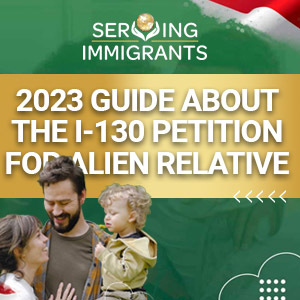
The USCIS I-130 Form is a family-based immigration document filed by a U.S. Citizen or LPR to establish a relationship with a relative or family member living abroad who may qualify for a family petition visa. It is the first step in the family-based immigration process. Form I-130 proves the existence of a familial relationship and is a necessary component of the green card application.
The I-130 petition must include specific information about the petitioner and the beneficiary. The petitioners must provide documentation of their citizenship or permanent residence status and the relationship shared with the beneficiary. Additionally, the beneficiary must provide proof of identity and other documents requested by the USCIS. These documents may include:
- Birth certificates
- Marriage certificates
- Passport
- Adoption papers
- Citizenship ID from the foreign country
The USCIS reviews the I-130 petition and decides if the relationship meets the criteria for a family-based green card or visa. If the petition is approved, the beneficiary will be eligible to apply for a family-based immigrant visa at a U.S. consulate or embassy.
Who Can Be A Beneficiary Of An I-130?
A beneficiary of an I-130 will be an alien relative with a verifiable relationship with a United States citizen or LPR. This relative may be a:
- a spouse
- parents
- siblings
- children
The beneficiary must meet all the requirements of the Immigration and Nationality Act (INA) to be eligible for an immigrant visa, which is the ultimate goal of the I-130 Petition for Alien Relatives. After the petition form is approved, the beneficiaries may apply for a visa and obtain a green card, as long as they meet other eligibility criteria. In some cases, a derivative beneficiary, which includes a spouse, parent, sibling, or child of the primary beneficiary, may also be eligible.
Eligibility Requirements For An I-130 Petition
There are certain eligibility requirements that you and your relative must meet during an I-130 immigration petition. If you are a U.S. citizen, you can file and sponsor an I-130 family petition for your following family members:
- Spouse
- Unmarried child under 21
- Parent
- Siblings
- Unmarried adult child
However, if you are a Lawful Permanent Resident (LPR), you can only fill out the petition for your spouse and children.

Attorney Magdalena Cuprys is a seasoned immigration lawyer based in Orlando and Coral Gables, Florida. With three languages under her belt and years of legal experience working with immigrants of all kinds, she brings considerable experience and insight to the field and works hard to explain immigration concepts, empower future citizens, and keep current and prospective immigrants up to date on US immigration law.
Connect with her firm, Serving Immigrants, to stay updated on the latest developments in United States immigration law and gain valuable insights needed to navigate the challenging legal landscape of immigration in Florida.
Call Us Now To Get Your Case Reviewed (305) 924-1133
Required Documentation For An I-130 Petition
Proof of relationship: To file an I-130 petition, you must provide proof of your relationship with the relative you are petitioning for. This can be done through birth certificates, marriage certificates, adoption papers, and other official documents.
Residence: If you are a U.S. citizen, you must be living in the United States to file an I-130 petition. If you are a lawful permanent resident or green card holder, you can file from either inside or outside the United States.
Affidavit of Support and Financial Evidence: You must also indicate that you can financially support the family member you are petitioning for by filing an Affidavit of Support. This document shows your income or assets will be enough to support your relative, including copies of your tax return transcripts and W-2s
Proof of U.S. Citizenship or Legal Permanent Residence: As the petitioner, you must establish your U.S. citizenship or legal permanent residence. You may provide a copy of your passport, birth certificate, naturalization certificate, or green card as proof.
Beneficiary’s Identity and Proof of Legal Status in the U.S.: The beneficiary should provide a copy of their passport or birth certificate to establish their identity. If the beneficiary is in the U.S, evidence of their legal residence, such as a visa, Form I-94, or employment authorization card, should be included.
Additional Evidence: It is a good idea to include additional supporting documentation that may be useful, such as photographs or letters showing the bona fide nature of the relationship between the petitioner and the beneficiary. This can include photos of family gatherings and social events and letters from family and friends confirming the legitimacy of the relationship.
I-130 Form Processing Time
The I-130 processing time will vary depending on several factors. One of these is that the USCIS divides the I-130 petition into two family-based immigration categories: immediate relatives and family preference.
Immediate relatives, which include spouses, parents, siblings, and children, have a faster I-130 process because of the bond they have with the petitioner. The rest of the relatives will be part of the family-preference category, who have to wait because the demand for green cards exceeds the number legally allocated.
The I-130 processing time can vary depending on the factors mentioned above. However, the USCIS websites provide estimated processing times based on the most recent application data. As of March 2023, the estimated processing time for the I-130 petition is between 10 to 30 months.
Can I Apply For Citizenship After Having An I-130?
Yes, it is possible to apply for U.S. citizenship through naturalization after having an approved I-130 petition.
To be eligible for citizenship, an individual must meet certain requirements, including being a lawful permanent resident of the United States for a certain time, having good moral character, and demonstrating knowledge of U.S. civics and English through a certified test. Additionally, the individual must have maintained continuous residence in the United States, and must not have spent extended time outside the country.
I-130 And I-485 Concurrent Filing
The concurrent filing of Form I-130 and Form I-485 is a great option that can save immigrants time and money. It allows petitioners to fill and submit at the same time their I-130 Petition for Alien Relative with the Form I-485 Application to Register Permanent Residence or Adjust Status, which is used by an individual physically present in the United States, regardless of their prior status.
For almost 20 years, Serving Immigrants has helped citizens and LPR in the United States reconnect with their families by helping them achieve successful lawful immigration. Be one of them by contacting our staff and scheduling a consultation with our family-based immigration attorneys!

Attorney Magdalena Cuprys is a seasoned immigration lawyer based in Orlando and Coral Gables, Florida. With three languages under her belt and years of legal experience working with immigrants of all kinds, she brings considerable experience and insight to the field and works hard to explain immigration concepts, empower future citizens, and keep current and prospective immigrants up to date on US immigration law.
Connect with her firm, Serving Immigrants, to stay updated on the latest developments in United States immigration law and gain valuable insights needed to navigate the challenging legal landscape of immigration in Florida.
Call Us Now To Get Your Case Reviewed (305) 924-1133